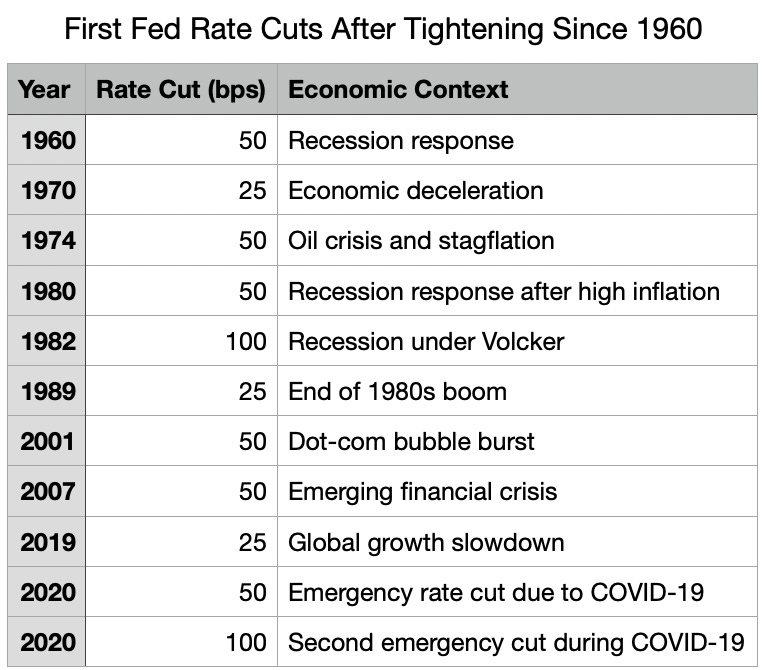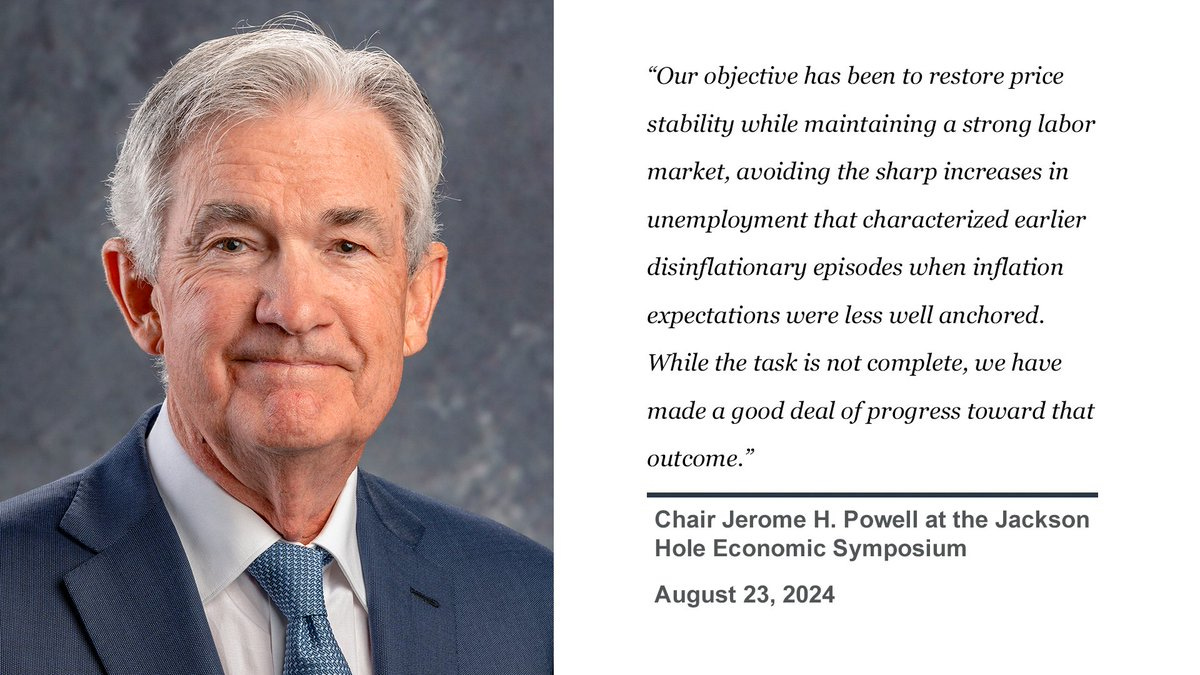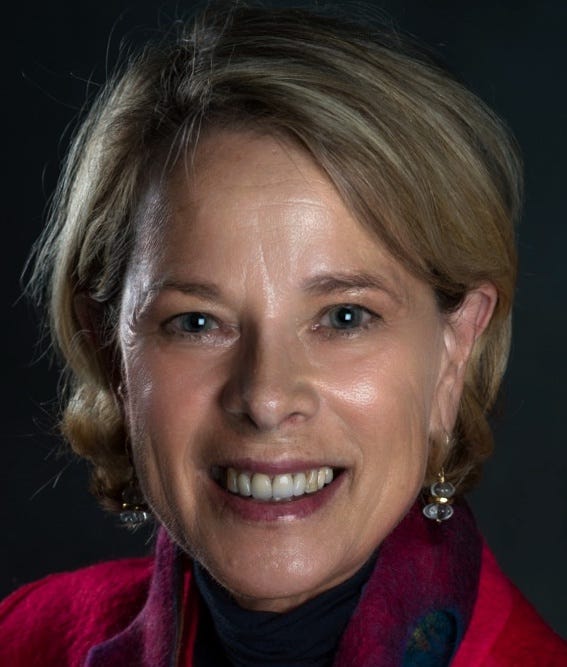↪ re: Forward Guidance vs Maximum Uncertainty
Economists are not astronomers. We do not wish merely to describe, but also to counsel –Adam Brzezinski (et al)
→ econVuere:Vue ↪ September 17, 2024

The Federal Reserve Open Market Committee meets today. After Jackson Hole, and until last week, a 25 bps rate cut seemed to be a certainty. That changed suddenly last week and a 50 bps cut has been gaining currency. The odds suddenly became even — the very definition of what Jim Bianco calls maximum uncertainty — about tomorrow’s decision to go either 25 or 50 bps. Does a last minute shift in sentiment mean that forward guidance is no longer working? What role did the media play in Federal Reserve communications?
The Fed blackout period began on Sept 9th. All of this news occurred during a period in which they cannot comment, although former Fed officials have been unusually active. As Bill Dudley writes in Bloomberg:
I expect the Fed will do 50. I believe Chair Powell favors an aggressive approach: In his speech at Jackson Hole last month, he pointedly observed that a further weakening of the labor market — which seems to be happening — would be ‘unwelcome’.
This string of X quotes from some premier Fed watchers show how quickly interest rate forecasts have changed:
“Unless we get more stories to clarify things, I cannot find another meeting, going back to the 1990s, that was 50/50 a few days before a meeting. This is due to the Fed's bedrock principle of ‘forward guidance.’
Forward guidance means telling them what you will do before you do it. Now, we have maximum uncertainty. Did Timiraos' story wreck forward guidance? Was this the plan or an unintended consequence?
– Jim Bianco, Bianco Research • Sep 13, 2024 (@biancoresearch)
“The amount of cuts over the next few months ‘is going to be a lot more important than whether the first move is 25 or 50, which I think is a close call,'said Jon Faust, who served until earlier this year as a senior adviser to Powell. ‘I don’t think we’re in a spot that really shouts out for a preemptive 50…but my preference would be slightly toward starting with 50. And I still think there’s a reasonable chance that the FOMC might get there as well.’ Faust said he thinks the Fed could manage concerns about spooking investors with a larger cut by providing ‘a lot of language around it.
– Nick Timiraos, Wall Street Journal • Sep 12, 2024 (@NickTimiraos)
“I think the Fed should cut by 50 bps. I feel we overanalyze each data point for what it means on timing & size of rate move rather than ask what ‘level’ of rates is appropriate.
– Greg Ip, Wall Street Journal • Sep 15, 2024 (@greg_ip)
The Fed Decision
As we approach the Fed pivot on Wednesday, given surprising uncertainty about the amount the Fed will cut and why, how will markets react? A bigger than expected cut could signal that the Fed is concerned about the economy, but would not be unusual. When the Fed has changed course in the past, rate cuts have usually been greater than 25bps at the outset. But in many of those cases, the cuts were more or less emergencies:
A chart from Bianco Research that shows the volatility that began with the Wall Street Journal report on Sept 12th. The questions are, 1) what does 25 vs 50bps matter, and 2) does forward guidance still work? We will find out on Wednesday. What would I do if I were the Fed Chairman? One 100 bps cut, instead of stringing this process out over the rest of the year.
If you haven’t already signed up for our econVue panel discussion tomorrow at 4 pm to discuss the Fed decision and Jay Powell’s press conference, details and registration information below:
We are running a poll on Twitter right now and so far, it looks like 2/3 are saying 25 bps. Here is a link to the poll:
–𝓁𝓎𝓇𝒾𝒸 💬
Editor-in-Chief
re:Vue is all our newsletters condensed into one convenient, unobtrusive weekly e-mail. You can select exactly which econVue newsletters you receive or omit, including this one, at any time in your econVue account..: Stories in ↪ re:Vue
↪: Now on econVue 🔈
1.:
🎧 THE HALE REPORT ® ⸱ Episode 56David Malpass — Can Better Policies Mitigate Risks to Global Growth? →
Hosted by LYRIC HUGHES HALE • JUN 26, 2024
Global debt continues to be the greatest threat to economic growth. In our 56th edition of The Hale Report, former World Bank president David Malpass outlines the problem and spillover effects on developing economies, including consequential humanitarian implications. After the Fed pivots on monetary policy this week, I believe fiscal policy will be the defining issue of 2025. 💬
2.:
🎧 THE HALE REPORT ® ⸱ Episode 59John Mauldin — Everything Old is New Again: Cycles & Rejuvenation→
Hosted by LYRIC HUGHES HALE • SEP 4, 2024
My guest is a household name in the world of finance, John Mauldin, co-founder of Mauldin Economics. His mission is to make investors aware of the risks inherent in business cycles, so they are better prepared to weather any storms. He makes complex topics approachable to broad audiences, including more than a million subscribers to his free weekly newsletter, Thoughts from the Frontline. 💬
3.:
👥 PANELSUpcoming Panel: Jackson Hole Part 2 – The Fed Decision (Sep 18) →
⧉ Background • ↳ Registration
MICHAEL LEWIS AND KARIM PAKRAVAN • SEP 18, 2024
4.:
👥 PANELSRecap: After Jackson Hole Part 1 →
Up to the Mountains, and Down with Rates
MICHAEL LEWIS AND KARIM PAKRAVAN • AUG 28, 2024
Our panelists include Chicago economists and econVue contributors Karim Pakravan and Michael Lewis, along with his colleague Gordon Parrish. They discussed the international implications of a potential shift in monetary policy, and expressed their views on recent US employment figure revisions. 💬
↪: Latest articles
5.:

§ RegionalStruggle sessions continue as India charts its own path: a framework for understanding US-China relations
LYRIC HUGHES HALE • AUG 22, 2024
US China policy, which is unlikely to change after the presidential election, is wrongly focused on strategic competition with China, which is unwilling to adapt to the realities of this new world. Both are following a path that will lead to success for neither.
Similarly, there are no signs that Chinese leadership is willing to re-engage in reforms that were halted beginning in 2012 when Xi Jinping came into power. The speed and direction of Xi Jinping’s new Long March will determine whether or not China and a reactive rather than proactive US are left behind on world’s road to economic progress. 💬
6.:
§ Policy & MicroThe search for yield gives way to the search for stability.
LYRIC HUGHES HALE • MAY 10, 2024
Yesterday was also a good day for global markets. However, over the past week, panic began with a dramatic plunge in Japanese and US equities. Most market commentators agree that there is no single, easily identifiable explanation, and none are sure that this episode of volatility is over. The Bank of Japan had long been expected to normalize interest rates. A weaker than expected US employment report might have fueled stock market gains, not losses, since it could signify lower interest rates sooner. Another factor might have been rumors of war between Iran and Israel. Here is more detail on three possible causes: the US jobs report, the yen carry trade, and unfolding geopolitical events. 💬
↪: Who’s on econVue
7.:
VOICES📍San Francisco
Marsha Vande Berg is a thought leader with expertise in international business, public administration and global affairs. Her emphasis is Asia Pacific markets, governance, sustainability and technology. She has written extensively about the Indian economy.
Focus
→ Insights about macro drivers and markets
→ Asia Pacific as growth center
→ Transpacific linkages and governance
8.:
VOICES📍New York
Richard Katz writes about the Japanese economy as New York Correspondent for Weekly Toyo Keizai of Japan, Japan Economy Watch, and is the author of a new book, The Contest for Japan’s Economic Future (Oxford University Press).
Focus
→ Japan’s economy
→ Japanese politics
→ U.S.-Japan relations
→ Innovation policy
🖊️ Vue⫶𝓹𝓸𝓲𝓷𝓽𝓼
⇣
econVue contributors share their latest thoughts on the global economy and their experiences covering it
⫶
9 .:
India’s New Budget Targets Foreign Investment →
AUG 13, 2024
⫶
10 .:
AUG 8, 2024
📌 Notes
11 .:
12 .:
12 .:
13 .:
14 .:
15 .:
16 .:
Keep reading with a 7-day free trial
Subscribe to econVue to keep reading this post and get 7 days of free access to the full post archives.
















